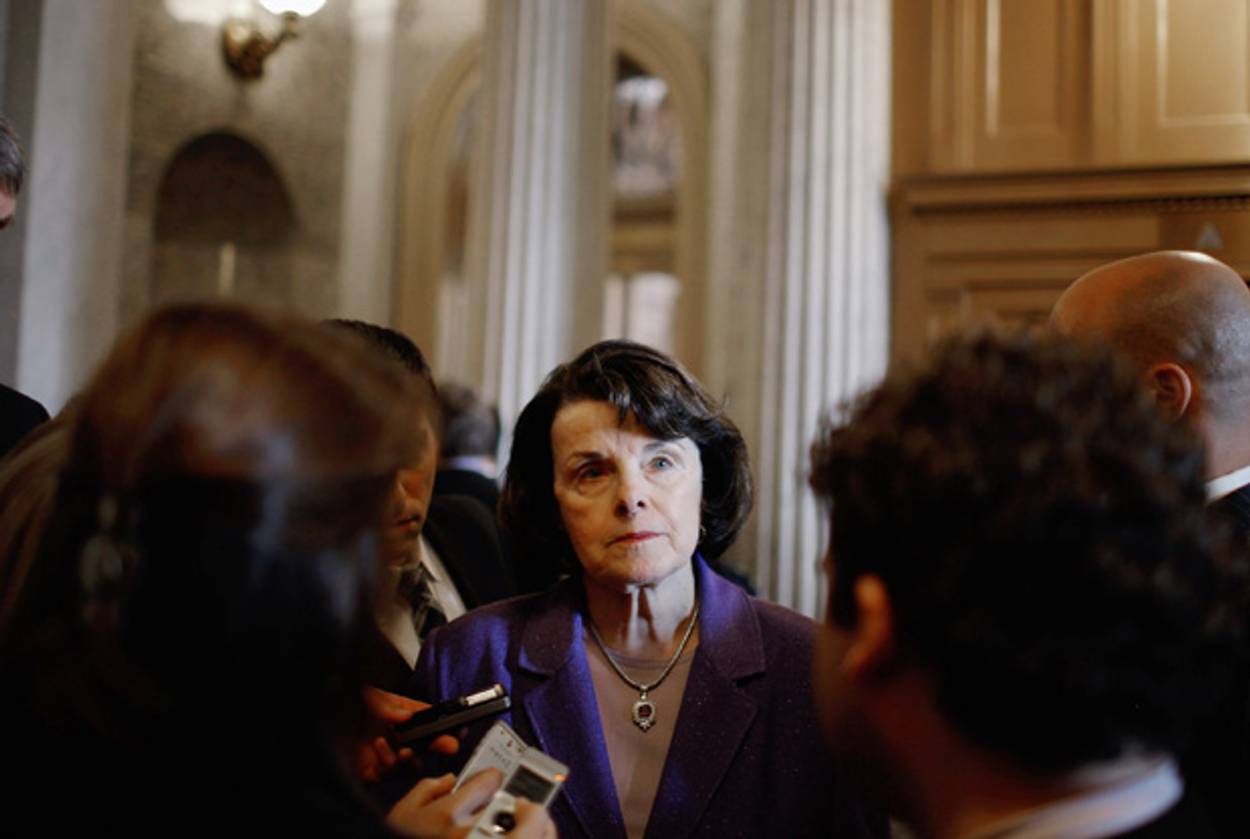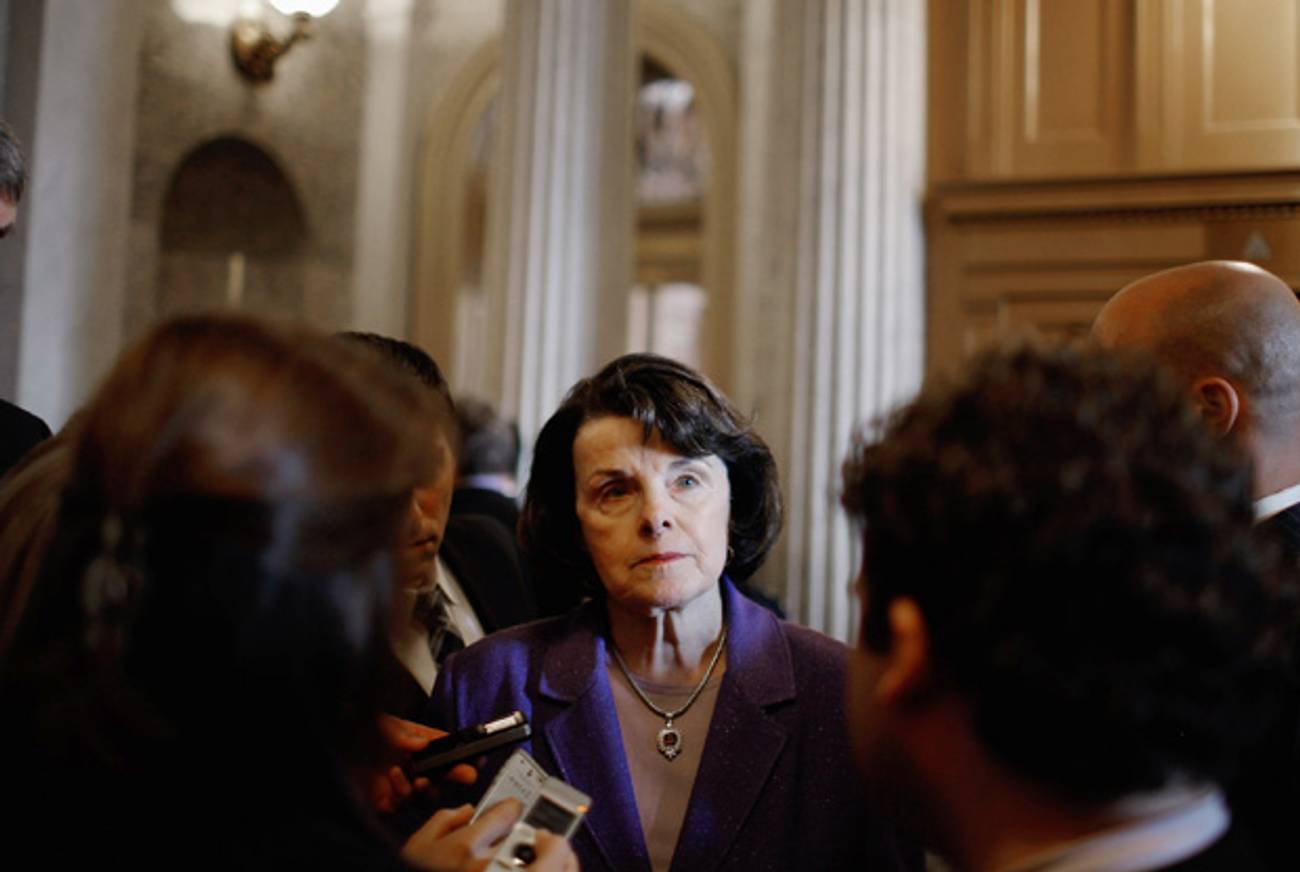J Street’s New Senate Ally
As Dianne Feinstein accepts its endorsement, the liberal Israel advocacy group gets the gravitas it craves




Pity California. The country’s most populous state, perpetually an afterthought in presidential primary politics, routinely compensates by offering up electoral sideshows like the 2003 gubernatorial recall, which showcased a field of 135 candidates including a porn star named Angelyne and the porn magnate Larry Flynt. That snap election ultimately gave Arnold Schwarzenegger—previously known as Mr. Olympia, Conan the Barbarian, and the Terminator—his most prized title: governor.
This year, 23 neophytes have paid $3,480 each for the opportunity to challenge incumbent Sen. Dianne Feinstein, the doyenne of Congress’ Jewish contingent, who has held the seat since 1992. Under new rules, the top two vote-getters in today’s primary will proceed to the general election in November—regardless of party registration. With the opposition candidates all polling below 5 percent, that opens up a window of opportunity for long-shot gadflies to make it to the general election ballot.
The list includes Orly Taitz, the Soviet Jewish émigré who styles herself the queen of the birther movement, and Nachum Shifren, formerly known as Norm, a native Malibu surf rat and Hasidic rabbi who, according to London’s Jewish Chronicle, once worked as a driver for the extremist leader Meir Kahane and more recently traveled to Britain to rally with the English Defence League, a nationalist, anti-Islam group. “Many of the other candidates,” said Jack Pitney, a political-science professor at Claremont McKenna College, “are an organic mix of nuts and vegetables.”
The likelihood that Feinstein will actually be unseated is accordingly negligible. She is one of the most popular politicians in the state, and despite being the victim of a $4.5 million campaign-funds embezzlement scam, she holds a cash advantage of $2.5 million over the official candidate of the state Republican Party, an autism activist named Elizabeth Emken. All of which explains why the announcement late last week that Feinstein had accepted the endorsement of the left-wing Israel advocacy group J Street was met not with the vitriol many pro-Israel groups heaped on Democrat Joe Sestak, J Street’s candidate in Pennsylvania’s 2010 Senate race, but with silence.
For J Street, Feinstein was a huge get. Aside from being a Democratic Party heavyweight, Feinstein is chair of the Senate Intelligence Committee and an increasingly important proxy for the Obama Administration on the Iranian nuclear threat—the issue that is animating current Washington debate about Israel. J Street, which launched in 2008 with ambitions to act as a progressive counterweight to the behemoth American Israel Public Affairs Committee, has struggled to find entree with Congress’ senior players. Feinstein lends them much-needed gravitas. “J Street is establishing itself as an element of the mainstream Jewish community,” said J Street’s head, Jeremy Ben-Ami.
For Feinstein, though, the upside is less clear. While the senator may have nothing to fear from courting a potentially controversial ally, she almost certainly doesn’t need the $100,000 that J Street estimates it will raise for her this year. She may benefit from raising her appeal among staunchly liberal partisans of California’s junior senator, Barbara Boxer, another Jewish Democrat from Northern California who is seen as energetically liberal where Feinstein is known for her measured centrism.
Feinstein, who supported the Iraq War in 2002, has been firmly in step with the White House—and with her old Senate pal Secretary of State Hillary Clinton—in pushing Israel toward negotiations with the Palestinians and in slowing the rush to war with Iran. “It’s all about how this is viewed in D.C., not in California,” said Thad Kousser, a political scientist at the University of California, San Diego. “This is someone who sees herself as a stateswoman planting her flag in the foreign policy terrain.” And, perhaps, a way to thumb her nose at AIPAC, which has consistently supported a muscular approach toward Iran. (Calls and emails to AIPAC’s current spokesman, Adam Harris, were not returned.)
J Street made its approach in April, after Feinstein wrote an op-ed for the San Francisco Chronicle defending Obama’s diplomatic approach toward Iran. “Her views were very close, if not identical, to J Street’s,” said Howard Dickstein, a board member of J Street’s political action committee and Sacramento lawyer who made his fortune representing Indian tribal gambling interests. “I don’t think she has to be fearful of any kind of retaliation or pushback.” Dickstein was joined in making the ask by J Street advisory board member Carol Winograd, a retired Stanford University professor of medicine and biology whose husband, Terry, served as a Ph.D. adviser to Google co-founder Larry Page. (Together, the Winograds have given more than $600,000 to Democratic causes in the past three cycles.)
Feinstein is only the second sitting senator to accept J Street’s endorsement; the other is Sen. Sherrod Brown, senior Democrat of Ohio. But accepting an endorsement is a long way from making a political marriage. “Perhaps if she were in a tight race things might be different, but politicians are not normally in the business of rejecting endorsements even if they’re from groups that are not necessarily the most popular on the planet,” said Gary Jacobson, a veteran political observer who is also a professor at UC San Diego. “You don’t have to endorse everything they say, you just say, ‘They’re part of my broad coalition.’ ”
And indeed Feinstein, a pro, has made sure to build in some daylight between her campaign and her new-found friends. Last week, Feinstein’s campaign adviser, Bill Carrick, told the New York Times the relationship was arm’s length at best. “We didn’t look at it as picking sides in the debate,” he said. “They wanted to endorse her and, basically, she said fine.”
***
Like this article? Sign up for our Daily Digest to get Tablet Magazine’s new content in your inbox each morning.
Allison Hoffman is a senior editor at Tablet Magazine. Her Twitter feed is @allisont_dc.
Allison Hoffman is a senior editor at Tablet Magazine. Her Twitter feed is @allisont_dc.